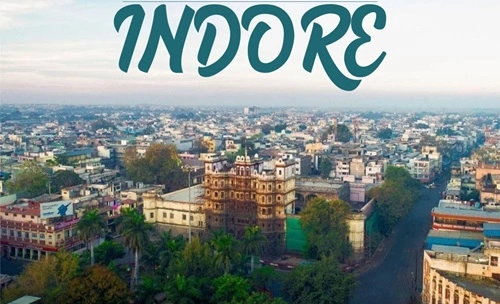India is now a thriving land of some of the best and ecofriendly cities that boast proper hygiene and cleanliness. The people of the city are increasingly moving towards eco friendliness and in the process, the cities are becoming cleaner and better in every sense. With more effective and innovative options for pollution control and waste management, Indian cities can now compete any other cities of any other country. In the last 10 years, this change was propelled with the cooperation of both the people and the city authorities, municipalities and of course, the government. Here are the Top 10 cleanest cities in India you need to know about.
List of Most Clean Cities in India
1. Indore: A Beacon of Cleanliness

India’s cleanest city, Indore, aspires for excellence. India’s cleanest city is Indore, thanks to its trash management, community engagement, and sanitary infrastructure. Indore is India’s cleanest city due to systematic and continuous cleaning. Municipal trash management includes collection and disposal. Effective waste processing cleans the city and reduces its environmental impact. Six times awarded India’s cleanest city, Indore excels. The city received this honour for its cleaning and sanitation efforts. Indore’s example encourages other cities to clean up and protect their ecosystems.
2. Surat: Transformative Urban Sanitation
Textile-producing Surat has improved urban sanitation. Surat is one of the nation’s cleanest cities because to waste segregation, intense cleaning, and community awareness campaigns. Surat’s environmental performance depends on waste segregation. Cities have robust initiatives to encourage residents and businesses to sort rubbish at the source. This thorough approach streamlines garbage management and recycles many waste kinds. Surat is one of India’s cleanest cities because it segregates waste. Surat’s urban cleanliness and waste segregation efforts are extensive. The city meticulously cleans public spaces and homes and businesses. These projects have made Surat cleaner and prettier. Surat’s proactive community awareness initiatives improve cleanliness. A clean city requires residents, thus Surat invests in community education and involvement. These activities foster civic pride and municipal cleanliness.
3. Navi Mumbai: The Planned City with a Clean Vision
Navi Mumbai, a planned city, is spotless. Its plentiful green spaces, excellent waste management infrastructure, and active public participation make this well-planned metropolis one of India’s cleanest. Green spaces help Navi Mumbai clean up. Clean parks, gardens, and open areas increase urban cleanliness and livability, as the city’s planners knew. Navi Mumbai’s many green areas improve the city’s appearance and provide leisure opportunities for a healthier living. Also important to the city’s cleanliness is garbage management. The Navi Mumbai waste management system collects, treats, and disposes of trash. This systematic approach reduces waste’s environmental impact. Waste management in Navi Mumbai has decreased urban litter and boosted its clean, sustainable image. Navi Mumbai’s cleaning relies on citizen engagement. Cleaning initiatives foster a sense of civic obligation in the city. Community-driven activities and awareness campaigns have improved municipality-resident collaboration and cleanliness.
4. Ambikapur, Chhattisgarh: Pioneering Waste Management
Ambikapur, central Chhattisgarh, has unique solid waste collection and disposal technologies. Sustainable practices make it one of India’s cleanest cities. Its ingenious solid trash collecting method makes Ambikapur’s waste management successful. Innovative cities emphasise sustainability and efficiency. Using cutting-edge technology, Ambikapur streamlines trash collection. Ambikapur’s urban garbage strategy is unique. Ambikapur’s cleanliness depends on solid waste removal. City waste disposal is eco-friendly and efficient. Sustainable trash disposal reduces Ambikapur’s environmental effect. The city promotes clean, sustainable living. Ambikapur’s cleanliness goes beyond trash removal. City green programmes and awareness promote environmental health. Ambikapur’s rigorous garbage control and community duty show devotion.
5. Mysuru, Karnataka: Preserving Heritage with Cleanliness
Mysuru has plenty of culture and cleanliness. The city is one of India’s cleanest thanks to its beautiful surroundings, good sanitation, and strict historical preservation. Mysuru is clean and attractive. Clean parks, gardens, and open areas beautify the city. One of the nation’s cleanest cities, Mysuru, is dedicated to beautification. The city’s cleanliness demonstrates its dedication. Mysuru’s urban cleanup policy covers everything. These programmes demonstrate the city’s cleanliness, from rubbish collection to public area maintenance. Residents that like city cleanliness help these efforts flourish. Hygiene and cultural preservation are linked in Mysuru. Monuments and landmarks maintain the city’s rich culture. This comprehensive plan preserves the city’s culture and promotes historical preservation and urban cleanliness.
6. Vijaywada, Andhra Pradesh: Bridging Tradition and Modernity
Historical and modern Vijayawada on the Krishna River strives for cleanliness. Creative riverfront development, extensive garbage management, and excellent public participation activities have renovated the city and proved its commitment to cleanliness. Riverside development in Vijayawada blends modern and traditional urban architecture. With its unique position, the city revitalises the Krishna River’s banks, creating beautiful and useable spaces. These projects boost municipal pride by improving appearance and providing leisure. Waste management is essential to city cleanliness. Vijayawada has unique waste collection, sorting, and disposal. Modern technology and sustainable approaches help the city manage rubbish and lessen its environmental effect. This garbage management dedication helps Vijayawada lead cleanup initiatives. Citizen participation activities drive Vijayawada’s success. City officials have started cleaning campaigns after seeing the transformative power of community involvement. Awareness initiatives and community clean-ups encourage accountability and cleanliness.
7. Ahmedabad, Gujarat: A Clean City with Cultural Flourish
Ahmedabad’s cultural heritage makes it an example of clean, sustainable urban expansion. The city is one of India’s cleanest due to waste-to-energy programmes and open spaces. Ahmedabad’s proactive cleaning measures aim to sanitise this city. Residential, commercial, and public places are cleaned citywide. These municipal and community-driven initiatives show Ahmedabad’s cleanliness and sanitation efforts throughout its landscapes. Waste-to-energy projects in Ahmedabad pioneer urban sustainability. Innovative waste-to-energy systems manage rubbish and create sustainable power in the city. This new waste disposal technology links Ahmedabad with global efforts to create eco-friendly and resource-efficient communities. Ahmedabad’s clean, sustainable metropolis needs green spaces. City beauty and environmental balance come from large green areas. Parks, gardens, and tree-lined streets benefit residents’ quality of life, biodiversity, and pollution reduction as urban ecosystem lungs.
8. New Delhi: Capitalizing on Clean Initiatives
The capital, New Delhi, has improved its ecology and cleanliness. To clean and maintain the city, air quality and rubbish management are being addressed. New Delhi is fighting pollution to improve air quality. The city decreases air pollution using green corridors, emission controls, and better transportation. Public transit and traffic management have reduced car emissions, improving air quality. Another New Delhi cleanliness and sustainability goal is waste management. City trash collection, sorting, recycling, and disposal are efficient. Waste-to-energy initiatives provide electricity while minimising pollution. Public knowledge and community engagement promote effective trash disposal. Beyond urban issues, New Delhi prioritises sustainability. Afforestation, green areas, and eco-friendly infrastructure are municipal priorities. These projects make the city more resilient by improving its attractiveness and ecosystem.
9. Chandapur, Maharashtra: A Clean Oasis in the State
Community-led initiatives, cleanliness, and rubbish management distinguish Chandapur, Maharashtra. Due to its cleanliness, the city is among India’s cleanest. Chandapur’s cleanliness depends on garbage control. Effective citywide garbage collection, sorting, recycling, and disposal are progressive waste management methods. Chandapur uses cutting-edge technologies and sustainable techniques to lessen its environmental impact and manage trash. City cleanliness and sustainability depend on waste management. Community-led cleanups benefitted Chandapur. The city has promoted environmental cleanliness via cleaning and awareness campaigns. Municipal and community partnership in Chandapur has encouraged cleanliness initiative ownership and involvement. This community-focused cleanliness method inspires pride and devotion.
10. Khargone, Madhya Pradesh: A Rising Star in Cleanliness
Khargone, Madhya Pradesh, is clean due to garbage control and community involvement. Cleanliness makes the city a rising star in India’s urban sanitation initiatives. Garbage management keeps Khargone clean. Innovative garbage disposal technologies include effective collection and disposal throughout the city. This comprehensive strategy cleans the city and lowers waste-related pollution. Khargone cleans cities using superior waste management and ecological methods. Citizen participation helps the city maintain cleanliness. Khargone residents feel accountable for the city’s cleanliness thanks to several activities and awareness efforts. Municipal authorities and the community have improved cleaning initiatives and instilled pride. Everyone is encouraged to clean Khargone using this community-driven initiative.
Conclusion: Building a Clean and Sustainable Future
As you can well realize having checked the list, these cities, once struggling with a lot of issues like garbage cleaning issues, litters on the streets, bad hygiene maintenance, have evolved overtime, and made a great change thanks to the combined efforts. The new policies and planning of sustainable urban city reforms have offered great results. The citizens have also come up with innovative solutions that too made effective changes in case of modern urbanization. India’s commitment and progress in case of completely sustainable urbanization is becoming a fact now. A cleaner and much greener nation is ahead.

